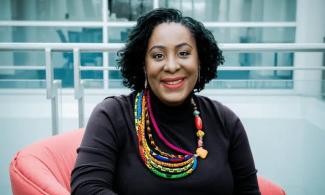
While some, including Jeff Bezos, founder of Amazon, criticised her for her tweets, many, especially citizens of various African countries and the Irish, stood with her.
Professor Uju Anya, who is under fire for wishing the late Queen Elizabeth II 'excruciating' death before the longest-serving monarch in British history died, has explained why she made the remarks.
Anya on hearing the news of the deteriorating health of the Queen last Thursday before her eventual death made the controversial tweet which the management of the microblogging app later deleted, saying it violated its rules.
“I heard the chief monarch of a thieving raping genocidal empire is finally dying. May her pain be excruciating,” Anya had tweeted.
However, despite the deletion of the tweet by Twitter, it continued to generate heated debate with many tweeps condemning her outburst while many others defended her.
While some, including Jeff Bezos, founder of Amazon, criticised her for her tweets, many, especially citizens of various African countries and the Irish, stood with her.
Reacting to Anya's tweet, Jeff Bezos wrote, “This is someone supposedly working to make the world better?
“I don’t think so. Wow."
But the Carnegie Mellon University professor who quickly defended her tweet responded to Bezos, writing, "Otoro gba gbue gi (Dysentery kill you). May everyone you and your merciless greed have harmed in this world remember you as fondly as I remember my colonisers.”
Uju in an interview with The Cut, published on Saturday, accused Queen Elizabeth II of sponsoring the “genocide” that led to the displacement of her family in Southeast Nigeria.
She revealed that half of her family members were killed with weapons given to the Nigerian Army by the late British government with the support of the late monarch during the Biafran War of 1967-1970.
She said, "This wasn’t just something I just read about. I was born to colonial subjects on both sides of the family — one parent from Trinidad, where the British enslaved people, and one parent from Nigeria.
"They met in England at university and moved back to Nigeria after independence in 1960. My parents were survivors of this genocide. My three siblings, two of them under the age of 10 at the time, were survivors. My mother was pregnant with my brother, who was born during that time; he was a war baby. This was the legacy I was born into in 1976.
"I spent the first ten years of my life living in Nigeria, and there was always this specter of who was lost. My earliest memories were from living in a war-torn area, and rebuilding still hasn’t finished even today. Half of my family was slaughtered with guns and bombs that this queen sent to kill us."
"Queen Elizabeth was representative of the cult of white womanhood. There’s this notion that she was this little-old-lady grandma type with her little hats and her purses and little dogs and everything — as if she inhabited this place or this space in the imaginary, this public image, as someone who didn’t have a hand in the bloodshed of her Crown. How did she have that Crown? Even the crowns she wears are looted, plundered from the lands they exploited and extracted from. The entire treasury is a legacy of thievery that was achieved by murder, by enslavement, and it didn’t stop after independence," she added.
When asked how the backlash over the tweets affected her, She continued: "I’m trying to do okay. I haven’t been on Twitter because I’m locked out, but the hate is coming into my email inbox. People are saying, “Oh, I don’t know what you’re on about because the queen oversaw the independence of Nigeria and Trinidad.” That’s meaningless.
"They were still Commonwealth nations. They have independence in a figurehead way, while Britain installed puppet leaders that bowed to the queen. Even the name Nigeria is from the British. They created this fiction of a country by just arbitrarily drawing lines around territories and saying, “Okay, this belongs to the British; this is what we’re going to call it,” and joining independent nations who had nothing to do with each other, didn’t speak each other’s language.
"And also electing certain groups they favored to be the rulers. This is the history of the monarchy, and the queen was the head of the monarchy. Whether she was involved in day-to-day decisions or not, she existed because of those decisions. She never once opened her mouth to say sorry for the role of her government in the slaughter of 3 million civilians."